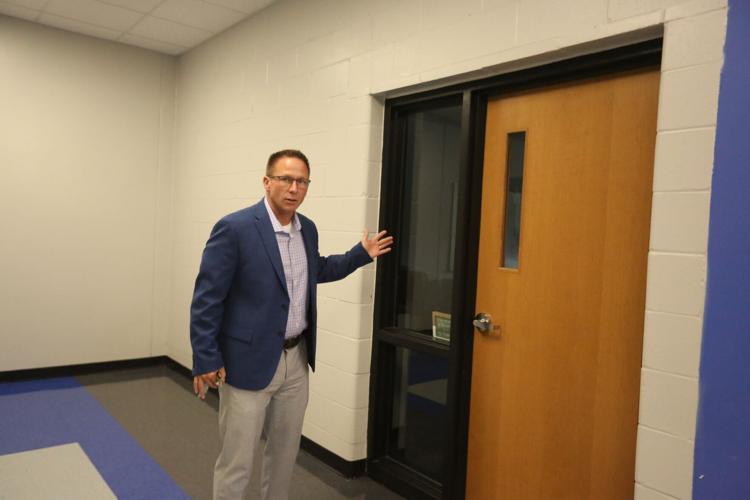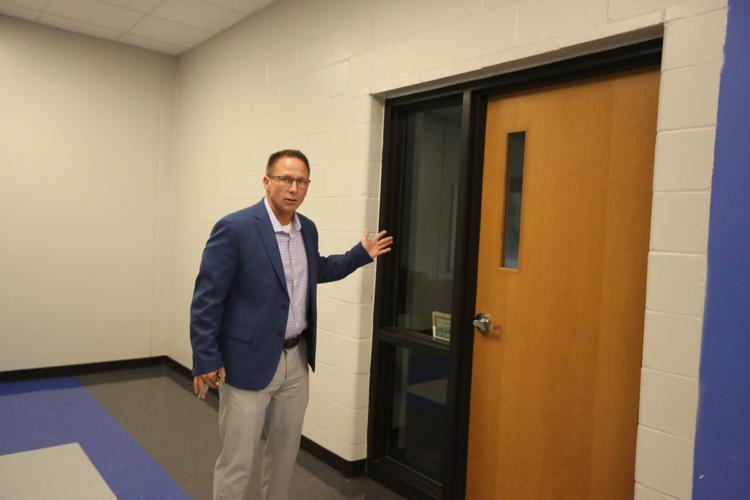Table of Contents
Iowa health care providers serving Medicaid patients hope increased competition will improve health outcomes, patient choice and quality of care for poor and disabled Iowans.
But after a sometimes-tumultuous six years of the privatized Iowa Medicaid program – which saw the exit of two for-profit insurers over heavy financial losses – providers and critics warn adding new insurers could cause disruption and patient confusion.
“We hope that patients benefit with appropriate management and appropriate care and quick prior authorizations,” said Joe Lock, president and CEO of Eastern Iowa Health Center in Cedar Rapids.
The federally qualified health center serves patients regardless of their ability to pay, including vulnerable children and adults, in Benton, Linn, Jones, Iowa and Johnson counties.
Roughly 70% of the more than 50,000 patient visits Eastern Iowa Health Center will see this year rely on Medicaid for their insurance, Lock said.
People are also reading…
“It remains really difficult for people with severe, profound disabilities of all different kinds, and it’s going to be confusing,” he said.
“It’s going to be confusing for patients, and it’s going to be hard on our staff as well just to help patients navigate things that should be fairly routine and simple. And often, they’re just not.”
Lock, though, said he’s hopeful that increased competition will “make everybody work harder and, ideally, work harder for their patients, which is what everybody wants.”
Five insurers have submitted bids to join Iowa’s $6 billion-plus Medicaid and Children’s Health Insurance Program, or CHIP, as state officials search for another managed-care organization.
The Iowa Department of Human Services, which oversees the Medicaid program, is expected to procure contracts with up to four bidders to provide care through the Iowa Health Link Medicaid program — meaning up to two additional managed-care organizations could join the state program in the near future.
However, the final number of awarded contracts under the procurement will be up to the discretion of DHS, according to its request for proposals.
The contracts are worth approximately $6.5 billion annually. Awards are expected to be announced Wednesday with implementation to begin July 1, 2023.
New contracts will run for four years with one possible two-year extension.
The five insurance companies who submitted bids to provide managed-care services are:
- Aetna, a private insurance company headquartered in Connecticut doing business as Aetna Better Health of Iowa.
- Current Iowa Medicaid managed-care organization Amerigroup Iowa.
- CareSource Iowa — The Dayton, Ohio-based CareSource is a nonprofit managed-care organization.
- Molina Healthcare of Iowa — Long Beach, Calif.-based Fortune 500 company provides managed health care services to approximately 5.2 million members under the Medicaid and Medicare programs and through the state insurance marketplaces.
- UCare Iowa, doing business as Ucare, is a Minneapolis-based nonprofit insurer providing health coverage and services in Minnesota and western Wisconsin.
Medicaid is jointly funded by states and the federal government to provide health insurance primarily for lower-income individuals under the age of 65 and those with disabilities.
Medicaid health benefits in Iowa currently are administered by two managed-care organizations – Amerigroup Iowa, a subsidiary of Indiana-based Anthem, and Iowa Total Care, a subsidiary of St. Louis-based Centene.
Amerigroup’s contract will end in 2023, and Iowa Total Care’s contract is up in 2025.
As of July, Amerigroup and Iowa Total Care served nearly 790,000 Medicaid and CHIP enrollees. Iowa’s Healthy and Well Kids in Iowa (Hawki) population is served by the same managed-care organizations and included in the total Medicaid population.
Approximately 93% of all Iowa Medicaid members are enrolled in a managed-care plan, with 7% remaining in fee-for-service.
Rocky transition
Iowa’s transition from a state-run system to a managed-care model in 2016 that put private insurance companies in charge of administering Medicaid benefits has been rocky.
The federal Centers for Medicare and Medicaid Services postponed the state’s original plan to begin managed care on Jan. 1, 2016, saying too many issues remained to safely transfer the care of 560,000 poor and disabled residents to three private for-profit insurance companies.
But once implemented, in April, the new Medicaid program in Iowa, known as IA Health Link, was plagued by complaints that service suffered, payments were not being made to service providers and promised savings never materialized.
Two carriers entered and quickly left the market within the first few years due to financial losses and what they described as chronic underfunding from the state.
CareSource officials, however, said in September of last year that they believe Iowa’s Medicaid market is now financially viable for at least four managed-care plans, and were excited to help Iowa “re-imagine what Medicaid can do for Iowans.”
“As a nonprofit organization we focus on our members and the communities we serve instead of shareholders. This makes CareSource unique in Iowa’s current managed care environment,” CareSource President and CEO Erhardt Preitauer said in a statement at the time.
“Our industry-leading social programs, complex care capabilities and core operations will result in improved quality and health outcomes for Iowa’s Medicaid population, while also providing a better experience for both members and the providers who care for them.”
Last year state Auditor Rod Sand issued a report alleging the state’s privatized Medicaid system had illegally denied services or care to program recipients, and the both private insurance companies managing the system violated terms of their contracts with the state.
Sand’s report was based on an investigation that examined cases from 2013 through 2019, which he said found a massive increase in illegal denials of care by managed care organizations.
The head of Iowa’s Medicaid program called the audit “incorrect and flawed,” stating the report inaccurately compared the previous “fee-for-service” system with a managed-care approach, the Associated Press reported.
Medicaid Director Elizabeth Matney questioned Sand’s methodology, stating the comparison failed to factor improvements built into the manged-care organizations’ appeals process.
Since then, things have stabilized, said Lock and Aaron Todd, CEO of the Iowa Primary Care Association in Des Moines.
The association provides technical assistance and training to Iowa’s 13 community health centers and one migrant health program.
Both said payments mostly are being made on time and issues resolved more quickly with managed-care organizations that have been more responsive.
Getting there, though, has required beefed up staffing to work with the insurance companies and pushing them for adequate service and on-time payments.
“The market is considerably more stable than it has been,” Todd said. “The state has stepped up and is funding the program at a level that is significantly more sustainable than it was when it was first rolled out.”
‘Merry-go-round’
Adding two or three more MCOs would ensure patient choice and gird against the state having to provide services directly should another plan fail or leave the state. Doing so, however, will be disruptive to many low-income Iowa families, Todd said.
“It’s really going to come down to the way in which the state decides to make this transition,” he said. “Are they going to reassign patients who are already with a current plan, or are they going to do it through some type of attrition process as there’s churn with Medicaid patients?”
Todd noted that will be problematic for Iowa Medicaid patients at a time when its also preparing for the end of a federal public health emergency that could impact coverage for tens of thousands of Iowa Medicaid and CHIP recipients.
The health emergency required Iowa Medicaid to take certain measures to protect Medicaid recipients during the COVID-19 pandemic. Those included waiving monthly premiums, expanding access to certain services and continuing coverage for those in the program even if their income changes.
Those protections are expected to expire this fall. Once the federal government ends the public health emergency, Iowa DHS goes back to its normal eligibility process – meaning tens of thousands of Iowans no longer eligible for Medicaid but still in the program because of the public health emergency could lose benefits and be forced to find other insurance plans.
“We’re going through a big period of transition for folks, and this is coming at the same time,” Todd said. “And so it’s really important that the communication is really clear.”
Iowa House Democratic Leader Jennifer Konfrst, D-Windsor Heights, agreed.
“Adding to more (managed-care organizations) to the mix will certainly add confusion — patient confusion and provider confusion,” Konfrst said Thursday during an Iowa Democratic Party weekly conference call with reporters. “And there needs to be a much better system of communication to those people who are getting these services.”
Konfrst added Iowans served by Medicaid don’t have the means to “wait for this system that we’ve been experimenting with for several years to figure itself out.”
“Iowans deserve a system that works for them,” she said. “And whether we have two or three or four, so far we’re not seeing that its doing what we need for it to do.”
Democratic state Sen. Herman Quirmbach of Ames joined Konfrst on the conference call.
“This merry-go-round of different insurance providers has done nothing but destabilize the patient-doctor relationship,” Quirmback said. “I’ve had so many calls, so many different cases, from my constituents of people whose continuity of care has been interrupted by that.
“It’s just been a total failure.”
A DHS spokesperson did not respond to emailed questions in time for this report.















More Stories
Ashwagandha’s Impact on Cortisol Levels in Stressed People
Health care cyberattack ‘likely one of the worst,’ expert says
Accessing Medicinal Cannabis in the UK: A Comprehensive Guide